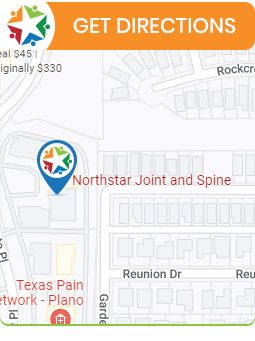Spondylosis Specialist in Plano, TX
If you’re dealing with spondylosis in Plano, TX, Dr. Robert J. Nocerini, a board-certified specialist at Northstar Joint and Spine, offers care. Spondylosis, a degenerative condition affecting the spine, can cause pain and stiffness. Dr. Nocerini uses advanced diagnostic techniques to develop personalized treatment plans aimed at alleviating discomfort and improving mobility. With his extensive experience, he helps patients manage spondylosis and restore their quality of life. For more information, contact us today or schedule an appointment. We are conveniently located at 7704 San Jacinto Pl Suite #200 Plano, TX 75024.


Table of Contents:
What is spondylosis, and how does it affect the spine?
What are the common symptoms of spondylosis?
When should I see a spondylosis specialist in Plano, TX?
What causes spondylosis to develop over time?
Why Patients in Plano, TX, Trust Dr. Robert J. Nocerini for Spondylosis Care
Spondylosis is a condition characterized by the degeneration of the spinal discs and joints, often due to the natural aging process. As we age, the discs between the vertebrae in the spine can lose hydration and elasticity, leading to wear and tear. This degeneration can cause the bones to rub together, leading to the formation of bone spurs or osteophytes. These growths can contribute to pain, stiffness, and decreased flexibility in the spine.
The spine consists of a series of vertebrae, separated by intervertebral discs that act as cushions, absorbing shock and allowing for movement. As spondylosis progresses, the discs may shrink or bulge, and the spinal joints can become inflamed. This can reduce the spine’s range of motion and lead to discomfort, particularly in the neck or lower back. As a result, individuals with spondylosis may experience symptoms such as chronic back pain, muscle spasms, or difficulty bending and twisting.
In some cases, the degeneration of the spine can put pressure on nearby nerves, leading to radiating pain, numbness, or tingling in the arms or legs. This can affect daily activities and overall mobility. While spondylosis is common as people age, its severity can vary. Early diagnosis and treatment are essential to manage symptoms and improve quality of life. Treatment options often include physical therapy, medications to reduce inflammation, and, in some cases, surgical intervention if the condition causes significant discomfort or mobility issues.
Spondylosis often develops gradually and can lead to a variety of symptoms, most commonly affecting the neck and lower back. One of the primary symptoms is chronic pain in the affected area, often accompanied by stiffness. As the discs and joints in the spine degenerate, movement may become more restricted, making it difficult to perform tasks that involve bending or twisting.
Muscle spasms are also common, as the body compensates for the loss of flexibility and the discomfort in the spine. These spasms can cause sudden, sharp pain in the back or neck, sometimes radiating to the shoulders, arms, or legs. In addition, individuals with spondylosis may experience numbness or tingling, particularly if the condition affects nerve roots. This occurs when bone spurs or other changes in the spine put pressure on nearby nerves, leading to sensations of pins and needles or a loss of feeling in the limbs.
Another symptom of spondylosis is reduced range of motion in the spine. People with this condition may find it difficult to turn their head, bend forward, or move from side to side without pain. The discomfort associated with spondylosis often worsens with activity or prolonged sitting or standing.
In some cases, radiating pain may occur, especially in the arms or legs, when nerves are compressed by bone spurs or other changes in the spinal column. The severity of symptoms can vary, with some people experiencing mild discomfort and others facing significant impairment in daily activities.
If you’re experiencing ongoing back or neck pain that doesn’t improve with rest or over-the-counter treatments, it may be time to consult a spondylosis specialist in Plano, TX. Early intervention can help manage symptoms and prevent further degeneration. A specialist can provide a thorough evaluation to determine the cause of your pain and create a personalized treatment plan.
You should consider seeing a spondylosis specialist if you notice symptoms such as persistent stiffness in your neck or back, muscle spasms, or difficulty moving the affected area. If your pain becomes more severe or starts to affect your daily activities, it’s important to seek professional care. For example, if you’re struggling to bend, twist, or perform routine activities without discomfort, a specialist can help identify the underlying cause and suggest appropriate treatments.
Additionally, if you experience numbness, tingling, or weakness in your arms or legs, these could be signs that spondylosis is affecting nearby nerves. A specialist can assess the severity of nerve involvement and offer treatments to alleviate pressure on the affected nerves.
Another indicator that you should see a specialist is if your symptoms are not responding to conservative treatments such as physical therapy, medication, or home care. A spondylosis specialist in Plano, TX, can offer more advanced options, including injections. Board-Certified Dr. Robert J. Nocerini, MD, at Northstar Joint and Spine is experienced in diagnosing and treating spondylosis, providing effective care to manage symptoms and improve mobility.
Spondylosis, often referred to as age-related degeneration of the spine, develops gradually over time due to the natural wear and tear of the spine’s discs and joints. As we age, the intervertebral discs, which act as cushions between the vertebrae, begin to lose hydration and elasticity. This causes them to shrink and become less effective at absorbing shock. Over time, the loss of disc height can lead to increased friction between the vertebrae, which may result in the formation of bone spurs, or osteophytes, as the body attempts to stabilize the spine.
In addition to the degeneration of the discs, the facet joints, which help support the spine’s movement, can also experience wear. The cartilage in these joints may break down, leading to inflammation and discomfort. As the joints deteriorate, they may contribute to the narrowing of the spinal canal or the spaces where the nerves exit the spine, causing nerve compression.
Repeated physical stress or overuse of the spine can also contribute to the development of spondylosis. Activities that involve repetitive bending, lifting, or twisting motions can accelerate the degeneration of the discs and joints. Other factors, such as genetics, poor posture, and certain lifestyle habits like smoking, may further contribute to the progression of spondylosis.
Though spondylosis is primarily associated with aging, individuals with these risk factors may experience the condition at an earlier age or with more severe symptoms. Early intervention can help manage symptoms and prevent further progression.
Patients in Plano, TX, trust Dr. Robert J. Nocerini, MD, for spondylosis care due to his extensive experience and patient-focused approach. With over 26 years of expertise, Dr. Nocerini is committed to thoroughly assessing each patient’s condition and creating personalized treatment plans. His in-depth knowledge allows him to effectively manage spondylosis symptoms and provide relief, whether through conservative methods or advanced interventions like injections.
Dr. Nocerini’s compassionate care and dedication to patient education set him apart. He takes the time to explain the causes of spondylosis and available treatment options, ensuring patients are well-informed and comfortable with their treatment decisions. At Northstar Joint and Spine, patients benefit from his expertise in diagnosing and managing spine-related conditions, making him a trusted choice for spondylosis care in Plano. For more information, contact us today or schedule an appointment. We are conveniently located at 7704 San Jacinto Pl Suite #200 Plano, TX 75024. We serve patients from Plano TX, Willow Bend TX, Frisco TX, Allen TX, Addison TX, North Dallas TX, and surrounding areas.

Check Out Our 5 Star Reviews


Additional Services You May Need
▸ Back Pain
▸ Shoulder Pain
▸ Chronic Pain
▸ Epidural Steroid Injections
▸ Spinal Cord Stimulation
▸ Viscosupplementation
▸ Genicular Nerve Blocks
▸ Facet Injections
▸ Joint Injections
▸ Sacroiliac Joint Injections
▸ Lumbar and Cervical
▸ Facet Medial Branch Blocks
▸ Diagnostic Nerve Blocks
▸ Medication Management
▸ Neck Pain Doctor
▸ Diabetic Peripheral Neuropathy
▸ Headaches
▸ Suboxone
▸ Peripheral Nerve Stimulation
▸ Spine
▸ Joints
▸ Muscles
▸ Bones

Additional Services You May Need
▸ Back Pain
▸ Shoulder Pain
▸ Chronic Pain
▸ Epidural Steroid Injections
▸ Spinal Cord Stimulation
▸ Viscosupplementation
▸ Genicular Nerve Blocks
▸ Facet Injections
▸ Joint Injections
▸ Sacroiliac Joint Injections
▸ Lumbar and Cervical
▸ Facet Medial Branch Blocks
▸ Diagnostic Nerve Blocks
▸ Medication Management
▸ Neck Pain Doctor
▸ Diabetic Peripheral Neuropathy
▸ Headaches
▸ Suboxone
▸ Peripheral Nerve Stimulation
▸ Spine
▸ Joints
▸ Muscles
▸ Bones






